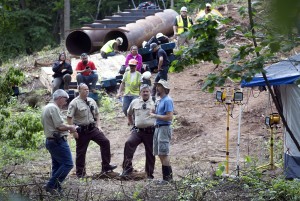From an Article by Mason Adams, Mother Jones Magazine, 5/25/20
One of the camp mainstays is known as Dustie Pinesap. She grew up in the Midwest, then trained in tree-climbing and forest defense in 2017 and 2018 against Pennsylvania’s Mariner East pipeline system before coming to Yellow Finch. “You don’t need to be able to climb a tree,” Pinesap said. “You can cook food. You can bring supplies. You can build structures. You can chop wood. There’s a lot of things to do.”
Pinesap recalls how poorly prepared Yellow Finch was for its first winter, but how MVP’s rival camp was even worse. Pinesap remembers security guards clad in cotton uniforms, shivering and staring at their phones in a tent heated with propane—what she called a “carbon monoxide special.”
“They’re out of their element and they don’t really know what to do,” Pinesap says. “We’ve got a fire here, we can cook over a fire. We fill in the shack and warm up by the woodstove. We’re chopping wood, we’re doing things, we’re being active. They [pipeline security] are sitting around like you would at an office job.”
Part of the power in the activists’ mission comes from the community support they have managed to garner. Though Hale and another local supporter, Crystal Mello, don’t live in the protest camp, they offer up their homes for the Yellow Finch folks to take showers and do laundry; they haul socks, toilet paper, food, and other supplies up the mountain each week.
The broader population in communities along MVP’s route tolerate Yellow Finch and the broader anti-pipeline campaign; many support their efforts outright. Handmade anti-pipeline signs appear along the roads near the pipeline, while visible pro-pipeline sentiment is non-existent. The biggest problem, Mello says, is a sense of fatalism that pervades the community: “Nobody likes this pipeline, but everybody says, ’It’s stupid, but what are you going to do, it’s coming anyway.’ It’s the saddest conversation.”
Mello, who became fast friends with Hale upon meeting him at the encampment, monitors law enforcement vehicles on the road to the camp with the help of a network of other locals. If any are spotted, she heads out to the Yellow Finch site to try and defuse the situation or, in case of arrest, provide jail and court support.
They make an odd pair. Mello, a 44-year-old single mother and grandmother, earns a living cleaning houses and emphasizes her local roots by wearing clothes bearing logos for the nearby high school and community events like the Eastmont Tomato Festival. At camp, she often takes the “gate” chore—a boring but essential job monitoring who approaches the camp—and she even spent a few days in one of the tree sits. Hale is one of the rare white cis men among a group comprised of mostly gender nonbinary activists.
Both Hale and Mello feel fiercely protective of the younger camp activists; Mello compares them to her kids’ friends, while Hale has at different times jawed with pipeline security and scuffled with a state trooper for picking on the protesters, earning misdemeanor assault and disorderly conduct charges. He was found not guilty of the first, but convicted and sentenced to 30 days on the second. (He has appealed the ruling.)
Still, Hale says he’s learning a lot from the pipeline fighters about white supremacy and gender politics. He’s learned about violence against transgender individuals, women, and people of color. They’ve broadened his worldview. “I’ve always been kind of a hermit,” Hale said. “I took care of myself and my family and liked to be left alone. Through this journey, I’ve had to step out of so many boxes. I’ve had to step outside of my comfort zone, like with pronouns. I never thought it was that important, but to some folks, it is. I’ve become more sensitive to folks.” In return, he shares his homesteading skills.
“Me being a mountain person, I hoped I’ve shared how to stay warm, how to stay dry, how to prepare water,” Hale said. “I hope these folks have learned from me, but I’ve learned way more from them. Before I started this, it was all about me. It was all about my farm and my family, and not about anyone else. But after I met these young folks living in the woods and coming up with random acts of kindness, it’s really touched my heart and opened me up.”
##########################
See also: Mountain Valley Pipeline requests variance to tunnel under Roanoke River — Article by Joe Dashiell, WDBJ/ Gray News, May 22, 2020
ROANOKE, Va. The Mountain Valley Pipeline is asking for permission to tunnel under the Roanoke River. In a letter to the Federal Energy Regulatory Commission this week, the company requested a variance to change the crossing method. The route of the pipeline crosses the river near Lafayette in Montgomery County. Pipeline construction stalled after a federal appeals court invalidated key environmental permits, but the company says it plans to complete the work by the end of the year.

